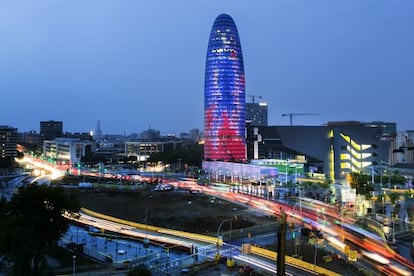Hundreds of companies leaving Catalonia over separatist drive
So far this year, the region has lost 683 businesses representing sales of over €1.5 billion


The Catalan independence drive is causing hundreds of businesses to leave the region out of fear of political and legal instability.
So far this year, 683 companies have departed Catalonia – including the chain Derby Hotels, multinational Suez and agri-food giant Valls Companys – with many of them transferring to Madrid. Together the firms represent combined sales of over €1.5 billion.
According to ratings agency Axesor, 3,286 businesses have left Catalonia since 2012, when the separatist drive began gaining traction.
Barcelona says the Spanish state is trying to “attack the reputation” of the Catalan economy
The drain does not come as a complete surprise, given that various business leaders had repeatedly warned about the risk of continuing down the path of unilateral independence.
Shortly before the September 27 regional elections – which were won by the separatist Junts pel Sí alliance – several Catalan companies had said they would reconsider their presence in Catalonia if unilateral independence were declared.
Among those that issued the warning were banks, publishing house Planeta, bridal wear chain Pronovias and pharmaceutical company Indukern.
Employer associations have underscored the climate of “legal insecurity” in Catalonia and the region’s particularly high taxes.
Think tank Círculo de Economía, whose board includes representatives from Catalonia’s biggest companies, said the separatist motion recently passed by the Catalan parliament signaling the beginning of the breakup with Spain has been detrimental to investment in the region.
Andorra: the new competition
Andorra has become a direct competitor to Catalonia. Lying less than 200 kilometers from Barcelona, the principality is trying to attract companies with a corporate tax rate of 10 percent –which can even be as low as 2 percent if certain conditions are met.
José Antonio Fernández, an entrepreneur who moved his tech company from Barcelona to Andorra, estimates that around 1,300 companies have done the same ever since Andorra introduced the new low rates, and that many of the firms are Catalan.
Círculo de Economía, which also represents Catalan academics and intellectuals, has noted that the creation of an unstable government in Catalonia – where internal arguing among separatist forces has so far prevented the appointment of a new premier – would only “magnify” the negative effects on the regional economy.
Of all the businesses to leave Catalonia, 306 have moved to Madrid, including the holding company Inaves – an umbrella group for several agri-food firms such as Valls Companys, which employs nearly 2,000 people.
At the same time, multinationals such as US-based food conglomerate Mondelez have decided to concentrate operations in the Spanish capital.
Tax attorney Antonio Durán Sindreu of Catalan law firm Durán-Sindreu said he did not get the sense that a big corporate drain was underway in the region, but confirmed there was “great legal insecurity” in connection with “the effects of the [separatist] resolution, particularly with regard to the part about disobeying the law.”
Meanwhile, the Catalan government is denying that the secession plan is triggering any kind of corporate flight. The secretary for corporate affairs and competitiveness, Pere Torres, said on Friday that every year between 700 and 1,000 businesses leave Catalonia, representing 0.2 to 0.3 percent of the total.
He added that the Spanish state was trying to “attack the reputation” of the Catalan economy.
But figures handled by Axesor show that the number of new firms in Catalonia is not compensating for the departures: this year, 683 businesses worth a joint €1.5 billion have left, while 133 worth €615 million have arrived.
Catalan government officials have suggested that companies are moving to Madrid over tax issues rather than perceived instability. But the Spanish capital is not the main destination of businesses that move for tax purposes: most of those go to Andorra and Ireland, which offer low corporate tax. Such is the case of the Catalan pharmaceutical Grifols.
English version by Susana Urra.
Tu suscripción se está usando en otro dispositivo
¿Quieres añadir otro usuario a tu suscripción?
Si continúas leyendo en este dispositivo, no se podrá leer en el otro.
FlechaTu suscripción se está usando en otro dispositivo y solo puedes acceder a EL PAÍS desde un dispositivo a la vez.
Si quieres compartir tu cuenta, cambia tu suscripción a la modalidad Premium, así podrás añadir otro usuario. Cada uno accederá con su propia cuenta de email, lo que os permitirá personalizar vuestra experiencia en EL PAÍS.
En el caso de no saber quién está usando tu cuenta, te recomendamos cambiar tu contraseña aquí.
Si decides continuar compartiendo tu cuenta, este mensaje se mostrará en tu dispositivo y en el de la otra persona que está usando tu cuenta de forma indefinida, afectando a tu experiencia de lectura. Puedes consultar aquí los términos y condiciones de la suscripción digital.








































